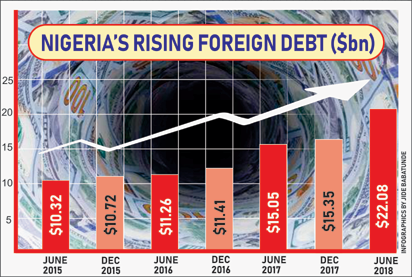There are no products in your shopping cart.
| 0 Items | £0.00 |

 NIGERIA has been warned to be mindful of her growing debt profile by the International Monetary Fund (IMF) after recent figures showed that the nation's debt service to revenue ratio was on the rise.
NIGERIA has been warned to be mindful of her growing debt profile by the International Monetary Fund (IMF) after recent figures showed that the nation's debt service to revenue ratio was on the rise.
Speaking yesterday in Abuja at the public presentation of a survey called the Regional Economic outlook: Sub-Saharan Africa, Capital Flows and the Future of Work, Amine Mati, the IMF senior resident representative in Nigeria, warned the government to act to address the matter. He also predicted that Nigeria’s economy will grow by 1.9% this year, up from 0.8% in 2017 due to fewer disruptions in oil production and the expected growth in the non-oil sector.
According to him, the recovery is expected to contribute about 0.7 percentage points to West Africa's average growth in 2018 and lift activity in Nigeria’s trading partners through stronger remittances, financial spillovers and import demand. However, Mr Mati lamented the fact that public debt was diverting more resources towards interests payments and cautioned that although Nigeria’s debt-to-gross domestic product (GDP) was quite low, over 50% of the country’s revenue went into interest payments.
He suggested that an increase in revenue was very important to bridge the gap in order to ensure that revenue-to-GDP was sufficient enough to pay up and service the debt profitably. According to Mr Mati, Nigeria’s debt/GDP ratio of between 20% and 25% is quite low but debt servicing which takes about 50% of revenue is certainly high.
With regards to Sub-Saharan Africa, Mr Mati said that the regional average was worse than the Nigerian scenario with debt/GDP ranging between 35% and 57% over the past five years. He noted that a lot more of the resources are going into paying interests and there is less to spend on capital expenditure.
Going forward, Mr Mati said the solution was for massive revenue to be mobilised to address the challenge but African nations especially Nigeria were not doing enough in that regard. He lamented the fact that sub-Sahara’s strategy has been to cut expenditure, rather than mobilising more revenue.
According to him though Nigeria has immense revenue potentials many of which have remained untapped, adjustment has relied on spending compression rather than revenue mobilisation. Mr Mati also noted that as the magnitude of capital flows to the region increased, so also the volatility grown.
Nnanna Okwu, the deputy governor, economic policy of the Central Bank of Nigeria (CBN), said capital inflows into Nigeria responds to both domestic and external shocks. He added that foreign direct investment inflows were becoming more diversified in response to the changing structure of the Nigerian economy.
Mr Okwu also said that there were certain factors shaping capital inflow behaviour in recent times, adding that high oil prices and growth in external reserves provides confidence for capital inflows into the country. He also said that tepid recovery from recession and relatively stable macroeconomic environment provided impetus for capital inflows back to Nigeria between 2017 and 2018.